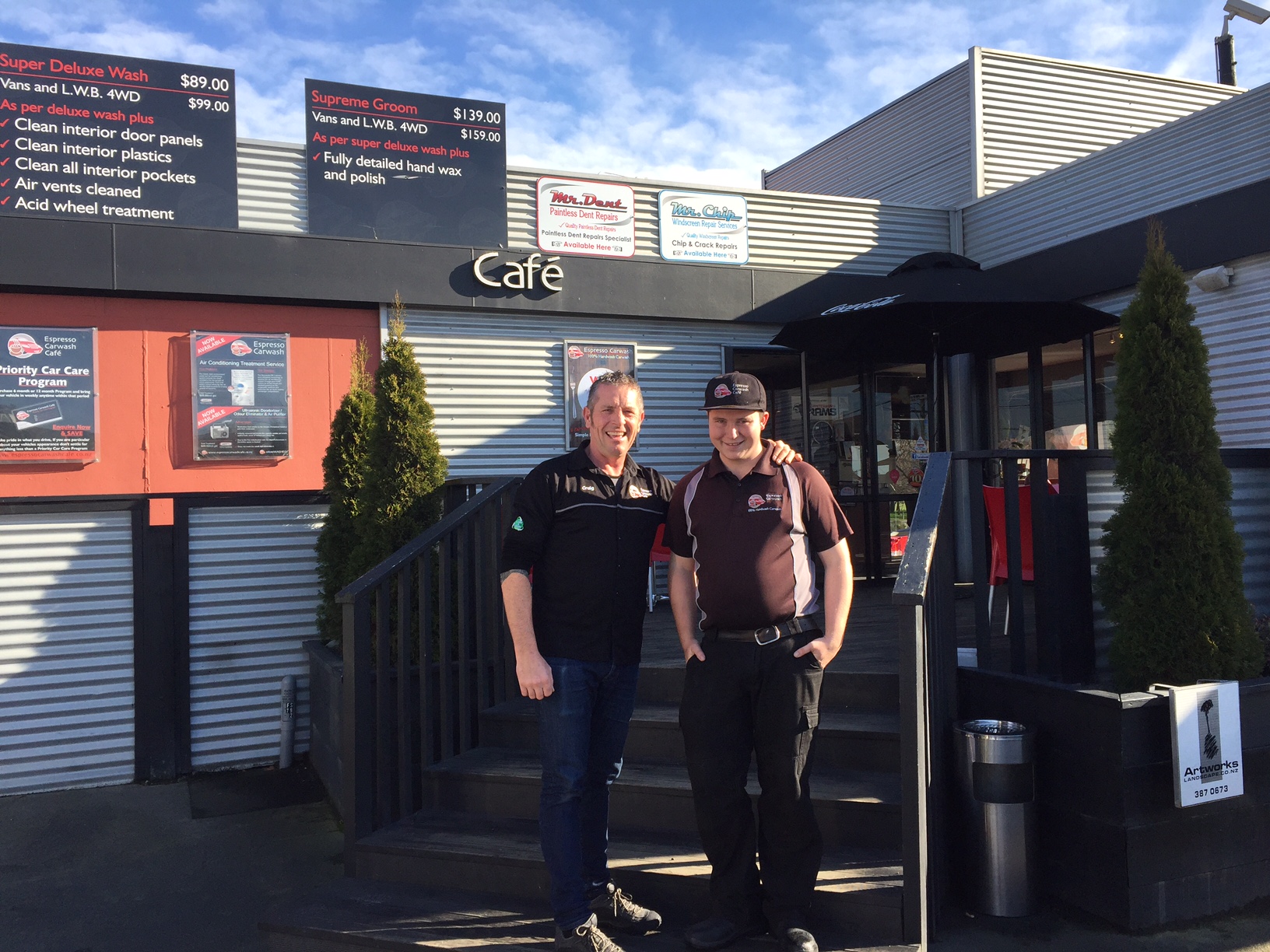Heather from Flax Floristry School shares her experience about running a small business: “Recently I travelled with Tracey Wildhaber to speak at an MSD Expo called “Helping Yourself Expo” I was asked to speak as an encouragement to those with disabilities, or those going through long term unemployment to look to their hobbies as a potential business opportunity. I suffer with severe early onset Osteo Arthritis which effects my mobility and live with chronic pain every day. I’m also managing 2 herniated discs in my lower back. Without Flax and Fibre and my Flax Floristry School I would be on a disability benefit. I can work and provide for my family because Flax Floristry is so flexible and varied. Even with disabilities and limited finances this career has helped me be Able. I wanted to share this opportunity to others, thats why I started Flax Floristry School. Flax floristry can be a life changing career option, especially for those who can only work 15 hours a week for what ever reason!”
Category Archives: Blog
Check back regularly for interesting features and articles.
Remembering Iwa

We are very sad to advise that our ‘volunteer’ for many years, Iwa, has passed away. For a number of years, Iwa has been coming to work at Catapult with his Mum Vicky, our Office Administrator. Iwa has been a real member of the Catapult family, his friendly presence helping clients to feel comfortable and giving them a welcome to the premises. We miss you Iwa. Thanks for being part of Catapult for so long.
10 tips for employers when hiring staff
Here are their top 10 tips:
Choose your words carefully: write inspiring, authentic job advertisements. If your recruitment team can’t do it, get someone who can.
Be realistic: create reasonable candidate specifications – wanting extreme levels of skill, attitude and experience is likely put off good candidates.
Canvas others: when designing employee value propositions, get input from recruiters and current employees.
Remember glass houses: recognise there is no such thing as perfect behaviour when using behavioural-based interview questions, especially given the organisation itself may be questionable in some of its conduct.
Consider the context: give due consideration to reference check results – if a candidate’s last boss says he or she was disconnected in the end, perhaps it’s because they were already in a high state of turnover intention.
Go back to the future: be open to hiring past employees. Initiatives such as alumni programmes can be used to connect with and recruit former employees.
Know your team: be open to conversations about the attributes and attitudes of the person a successful candidate will be reporting to, and the team they will be working with.
Be technology wise: use automated recruitment technology (such as SnapHire, JobAdder or QJumpers) to enhance – not replace – an integrated people-oriented recruitment experience.
Provide clear pay ranges: if an applicant knows what the pay is from the outset, it saves everyone valuable time and energy.
Be gracious: formally thank all candidates for applying – this can help ensure you retain them as future applicants and/or customers.
Leadership

Some are born with the skills to lead, others gain them.
But we probably all know people who have tried to lead without them, or more unfortunately, have been in a team “led” by someone devoid of them.
Poor leaders can be indecisive, lack in empathy or look at leadership as control: the excuse to “strut their stuff” and boss others around when really, true valued leadership has to include empathy, guidance, fairness and recognition of others’ contributions while providing overall support and shared decision-making.
Several of us at Catapult attended a seminar which not only reinforced that but taught us a whole lot more about effective, positive leadership including how to decide on the degree of leadership required to match the skills and experience of those in the team.
The two-day course was run by the New Zealand Institute of Management, https://www.nzimleadership.co.nz/programmes and was based on the Four Quadrant Leadership Trust theory as developed by Wilfred Jarvis http://wjinst.com/wjinst/4ql.htm
Now, we’re a small cohesive team here at Catapult not awash with teams and leaders and when the suggestion was made that we should attend the course some of us were a bit unsure if it was really going to be relevant. But it was.
We all came away with some clearer ideas on how to recognise the strengths of others in a team and how we can apply the Four Quadrant Leadership theory not just with Catapult colleagues but with those who come to us for assistance in gaining employment: we become a focused team – in the job seeker workshops we run as well as in our broader interaction focused on working together to achieve the same goal.
Team Work

“We’re a team and we’ll make it happen together.” This is the message we make clear to job seekers that come to our service: it’s not Catapult consultants working for you but working with you. Some people shy away from that but others really like the opportunity to be involved and take ownership of their future. We’d like to share a great example of this.
Leading up to her success in finding employment this job seeker was always willing to try every avenue we suggested.
She and I had a chat about what she’d found to be valuable in working with us at Catapult.
“For me the best part was being able to get used to the one person [consultant]…I felt at ease, didn’t have to explain myself again and again, I felt relaxed there. My confidence was probably pretty low and so at interviews I often didn’t come over as the person I really am. I took up the chances that were arranged for me to help me feel more confident – a course at ARA and volunteering. And everyone at Catapult, they’d boost my confidence too and that helped me feel positive. The volunteering I did was also good for that… it was much better to be doing something worthwhile and useful.”
And that’s the thing – we emphasis to job seekers that while they’re looking for paid employment it’s a great idea to register with an organisation to volunteer. It’s a win/win: the organisation gets the volunteer’s support and the positive involvement gives the volunteer’s self- esteem a boost, a potential referee and something positive happening to fill that current blank space on their CV.
This job seeker was already volunteering with the Salvation Army in one of their retail stores when she came to us. That was great customer service experience but an administration volunteer role we found for her at Addington Net was more related to the type of work she was looking for so she also took that on as well.
The very act of getting out of the house and into the community is in itself a powerfully positive step and proving reliability is invaluable, I doubt that there’d be any employer who wouldn’t rate it as a fundamental if not the fundamental attribute they look for in an employee. So keeping appointments with us and attending our workshops are some of the ways a job seeker can build up that fundamental employment expectation.
Regular attendance at our six, hour-long workshops is a real positive for job seekers and in this example the comment made was that the session on cover letters was particularly useful: “they explained how to personalise it and I hadn’t done that before.” Before long the only involvement she needed from her consultant was a collaborative comment here or there: she’d gathered the knowledge and skill to create great cover letters by herself.
The more a job seeker can “own” the process of getting employment the better the outcome.
Employment Support
 ot, we’re all pretty familiar with the supermarket scene and from the facial expressions of most shoppers, the mode is: “grit teeth and get it done”.
ot, we’re all pretty familiar with the supermarket scene and from the facial expressions of most shoppers, the mode is: “grit teeth and get it done”.
That’s why employees who have a cheerful, welcoming disposition and a smile to share are valued so much by supermarket managers.
Luke who was supported into employment by Catapult was one such employee. So, when after years of employment some difficulties arose, the management sought Catapult’s assistance to resolve them.
Why contact Catapult?
Luke had been involved with a particular consultant here and supermarket management thought he’d be comfortable talking with him. Also, because the management had had contact with the consultant they knew that he understood the requirements needed to fill the job.
Post-placement employment mentoring is part of Catapult’s ‘knitting’: we know that one of the most important assets a business has, is its employees, so we’re ready to do what we can to ensure the employment process goes smoothly.
After a couple of chats with Luke during which it became clear just why the problems had developed, the consultant and Luke met together with the supermarket manager and talked over some options.
The outcome was that Luke’s working hours were adjusted to suit his lifestyle better, in a less physically demanding role than the previous trolley work and away from the vagaries of the weather.
What didn’t change was his positive interaction with customers: his broad smile and friendly manner.
Work experience is invaluable
 The seed is shown early on: “What do you want be when you grow up?” Albeit not asked in expectation of a seriously studied answer from a primary schooler but asked nonetheless when actually, you’re damn lucky if you have the answer when you’re leaving school.
The seed is shown early on: “What do you want be when you grow up?” Albeit not asked in expectation of a seriously studied answer from a primary schooler but asked nonetheless when actually, you’re damn lucky if you have the answer when you’re leaving school.
And, If you don’t have the answer, getting some paid or unpaid hands-on work experience is a very positive step towards finding it. Work-shadowing is also an option where the aim is to gain an insight rather than hands’ on experience. Along the way you’re identifying your strengths and discovering what makes you happiest.
These experiences aren’t always easy to get but at Catapult we can help people explore the opportunities and broaden their horizons.
Recently, a job seeker Catapult’s supporting into employment, did just that:
“I’d been discussing potential careers with my Catapult consultant,” says Neil, “and he said that there was an opportunity to see what dog grooming was like. So I thought well, I did want to work with dogs but was more interested in care and training. But then I thought well, why not give it a go… an opportunity presented to me.
“I researched the type of work and actually, I started to feel a little bit anxious about it but talked to another dog groomer and went back to Catapult for a talk. That helped me feel more confident”.
On that first day, as well as shadowing the handlers while they pampered, bathed and brushed numerous dogs of all shapes and sizes, Neil also had some hands-on experience bathing the owner’s precious, miniature poodle – surely a sign that he was developing good skills.
“Yeah, I was told I did very well so quite happy with that. And it really gave me an appreciation of how much work is put into grooming”
Next time, Neil was bathing other dogs, brushing mostly little dogs and a golden Labrador.
And did he see it as a worthwhile experience?
“Yeah, a little surprised I must say. Personally, I’m not a fan of the little puffball dogs – but good just seeing the end result, good to see the work put in: the little dogs looking more fancy.
“Even if an apprenticeship doesn’t happen I still think it was an invaluable experience and I’ve made connections”.
Finding staff at short notice
 Managing a fluctuating workload has many challenges. Not least of these is finding staff, often at short notice, with the motivation and flexibility to work on a casual basis.Dave is a business data-cabling contractor and often doesn’t know from one month to the next what his work load will be; whether he still has the same pool of casual staff to call on or where his new staff will be found. The stuff of logistical nightmares for some but not so for Dave. He’s managed it long enough to have established systems to bring it all together and that’s where Catapult helps out.
Managing a fluctuating workload has many challenges. Not least of these is finding staff, often at short notice, with the motivation and flexibility to work on a casual basis.Dave is a business data-cabling contractor and often doesn’t know from one month to the next what his work load will be; whether he still has the same pool of casual staff to call on or where his new staff will be found. The stuff of logistical nightmares for some but not so for Dave. He’s managed it long enough to have established systems to bring it all together and that’s where Catapult helps out.
“The first time I was in touch with Catapult was about nine years ago. Just by chance I met a person who’d worked for me. He told me that he was getting employment support from Catapult – I hadn’t heard of them before. So I got in touch with them and employed him again. “ On and off since then, Dave has used Catapult to find other staff.
He says what impresses him about Catapult is that a clear understanding of his situation and labour needs has developed. Also that the consultants don’t just refer to the job seekers they’re working with individually – they have a chat between themselves to consider any of the job seekers each of them is working with in order to put forward people they think could realistically meet those needs.
“They’re not just supportive of them [job seekers] but employers as well” says Dave “Their support makes it easier to employ the people they put forward.”
Farewell to Ali
 Ali Brown retired from her role as Catapult’s CEO in 2017. We held a farewell party for her at Catapult and were joined by colleagues, friends and Catapult supporters, many of whom had Ali-focused yarns to share. Kev Blogg, Catapult’s founder and patron, was amongst them and commented in his toast to Ali that employing her had proven to be one of the best things he’d done for Catapult.
Ali Brown retired from her role as Catapult’s CEO in 2017. We held a farewell party for her at Catapult and were joined by colleagues, friends and Catapult supporters, many of whom had Ali-focused yarns to share. Kev Blogg, Catapult’s founder and patron, was amongst them and commented in his toast to Ali that employing her had proven to be one of the best things he’d done for Catapult.Brilliant attitude at Espresso Carwash Cafe

Down to earth and pragmatic, Craig is ready to give anyone a go and has an inclusive attitude towards his employees: “You know honesty and enthusiasm are the basic things I look for. If they’ve got that and they’re ready to take on new tasks, why not give them a go”. And let’s be clear here, getting those vehicles sparkling isn’t a job for slouches it also requires fitness and an eye for detail. He needs a strong team to make that great service at Espresso Carwash Café happen. It’s a fast and efficient daily turn-around of, on average, 100 vehicles that are driven in looking a tad shabby and after the 100% hand wash vehicle valet service are driven away looking sharp.
One of those team members is Tim Tattersall a Catapult client who under Craig’s guidance has become a valued employee. Right from the start Craig could see that Tim had qualities that matched his expectations of honesty, and enthusiasm for the job and, what’s more, he could see Tim’s potential. “Tim’s got heaps of that,” says Craig, “he’s one of a team of good guys that help me to run a good business. You know, repeat customers often comment on our ‘awesome team’”.
Tim’s family contacted Craig shortly after he first took him on. They wanted to be sure that Craig understood how autism affected Tim’s social and workplace interactions. “I said to them, ‘Hey, don’t worry, you’ve got a great boy there, he brings happiness to the workplace’”. Tim’s skills and aptitude have increased. He started on 1 or 2 hours a week and now those hours have increased up to 20 sometimes 24 a week. “Tim is fully committed to the job,” says Craig, “sometimes, even if the weather’s bad, he turns up just because it makes him feel good to be here.”
Craig mentions that some guys he interviews just don’t seem to have any enthusiasm while others just don’t prove to be reliable: Tim is super reliable, and loyal, wearing the company shirt and hat with pride. Craig understands that everybody has their own set of challenges but admits that he hasn’t always been prepared to be so tolerant or inclusive in his attitude towards others. “I was brought up on a farm, I’m a country boy, my Dad was a pretty hard taskmaster so I developed a fairly tough attitude. It [understanding] has sort of grown since having my own kids – I know how I’d want them to be treated in a workplace”.
Being understanding of individual challenges, working around a challenge to utilise strengths, generally getting to know your employees is something that Craig thinks really does make for a much more positive and successful work environment for everybody.







